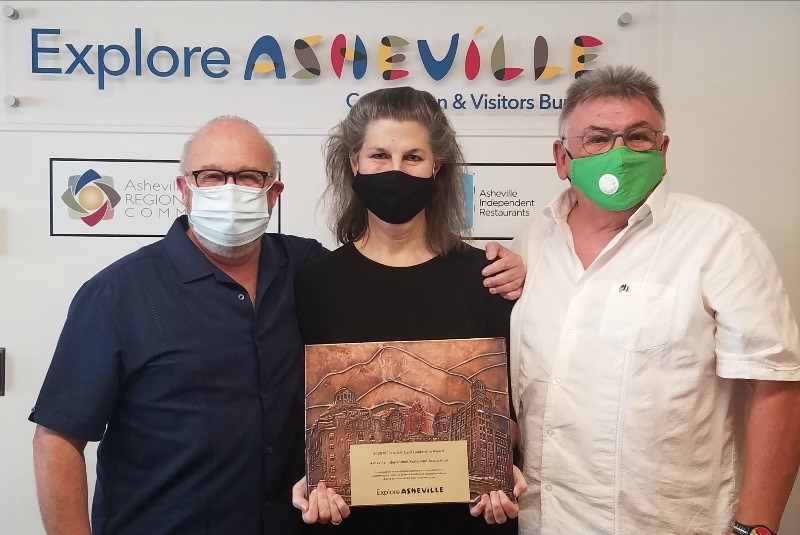When Jane Anderson, executive director of the Asheville Independent Restaurant Association, learned in early October that the 17-year-old organization she has helmed since 2013 would receive the Buncombe County Tourism Development Authority’s 2020 William A.V. Cecil Tourism Leadership Award, she thought of the groups and community leaders honored in previous years: Pat Whalen of Public Interest Projects; Highland Brewing Co. founder Oscar Wong; and RiverLink founding director Karen Cragnolin are among the honorees.
“I cried,” Anderson admits. “It is a real tribute to this organization, especially this year, the most challenging year our members have ever faced. I have seen firsthand their incredible resilience, and it has blown me away.”
The good news helped soothe the sting of two hard decisions AIR was forced to make in late summer in response to COVID-19. At the recommendation of a sustainability task force, the AIR board of directors canceled the 2020 Taste of Asheville event, which is normally held every November, and suspended production of the AIR Passport, a booklet that offers discounts and complimentary items at participating AIR restaurants.
“We obviously could not gather indoors as we normally do for TOA,” she points out. “And the passports require restaurants to essentially give away food, which is not feasible now.”
Back in March, Anderson couldn’t have imagined that before the end of 2020 AIR would have to pull the plug on its two biggest annual efforts. At that time, as she struggled to get a handle on the immediate implications of the mysterious virus that hovered ominously over her industry, her immediate response was to call a meeting of AIR members, inviting city and county officials to offer insight into what might lie ahead.
In attendance at the March 16 meeting were Buncombe County’s emergency preparedness director Fletcher Tove, medical director Dr. Jennifer Mullendore, and Health and Human Services food and lodging supervisor Felissa Vazquez fielding questions from over 50 restauranteurs.
“There weren’t a lot of answers that day,” Anderson recalls. “What struck me was that when people are in a situation like this, they just want to be with other people in the same situation. The next day, the governor ordered restaurants closed, and we went into completely uncharted territory.”
Desperate to navigate the choppy waters, AIR immediately created a Google doc spreadsheet where restaurants could share information about whether they were totally closed or pivoting to takeout, which was still permitted by the state. In the early days of the pandemic, the document had to be updated daily, sometimes hourly.
“When we realized it was not going to resolve anytime soon, we knew we needed something bigger, better and more accessible,” says Anderson. About two weeks later, with the help of Melissa Dean of Two Birds Marketing, AIR launched the Food in Asheville website listing local takeout and delivery options. (It now also includes a link to dine-in restaurants.)
Some casual concepts that already did a healthy to-go business segued fairly smoothly to a takeout-only model, Anderson says, while some restaurants downsized and tweaked dine-in menus to accommodate travel in a box. Others realized the numbers would just not support moving to a to-go model and entered a holding pattern.
When Phase 2 of North Carolina’s reopening plan — which allowed indoor seating at 50% capacity — kicked in at the end of May, Anderson says she received a call from a restaurant owner who was in tears because her small dining room couldn’t accommodate enough customers to be worth relaunching. “She told me if she did not get some help from the city on outdoor seating, she would be dead in the water. I reached out to the city, and days later she was seating people outside and feeling reenergized.”
The worried caller and other restaurateurs were helped by the AVL Shares Space Initiative, which expanded outdoor seating areas, and grants from the BCTDA’s $5 million Buncombe County Tourism Jobs Recovery Fund, which provided money to create alfresco dining spaces.
In late September, the city shared the good news that it would extend the Shares Space Initiative past its original Oct. 31 end date until Jan. 3. The bad news, though, is that winter is coming.
Asheville restaurants face an offseason more daunting than ever before, and Anderson says their survival will depend heavily on support from local customers. AIR is currently gathering information about member restaurants’ holiday hours and offerings as it does every year. But in general, she is putting her faith in AIR members’ tenacity to help them make it through January and February — traditionally the slowest months for Asheville restaurants — as well as locals’ loyalty to homegrown hospitality.
And Anderson says AIR will be with them every step of the way. “Like our members, AIR has to do things differently for now, and like our members, AIR is resilient,” she affirms. “I am in awe of how they are handling the craziness, taking care of their staff and still feeding and welcoming guests.”




Before you comment
The comments section is here to provide a platform for civil dialogue on the issues we face together as a local community. Xpress is committed to offering this platform for all voices, but when the tone of the discussion gets nasty or strays off topic, we believe many people choose not to participate. Xpress editors are determined to moderate comments to ensure a constructive interchange is maintained. All comments judged not to be in keeping with the spirit of civil discourse will be removed and repeat violators will be banned. See here for our terms of service. Thank you for being part of this effort to promote respectful discussion.